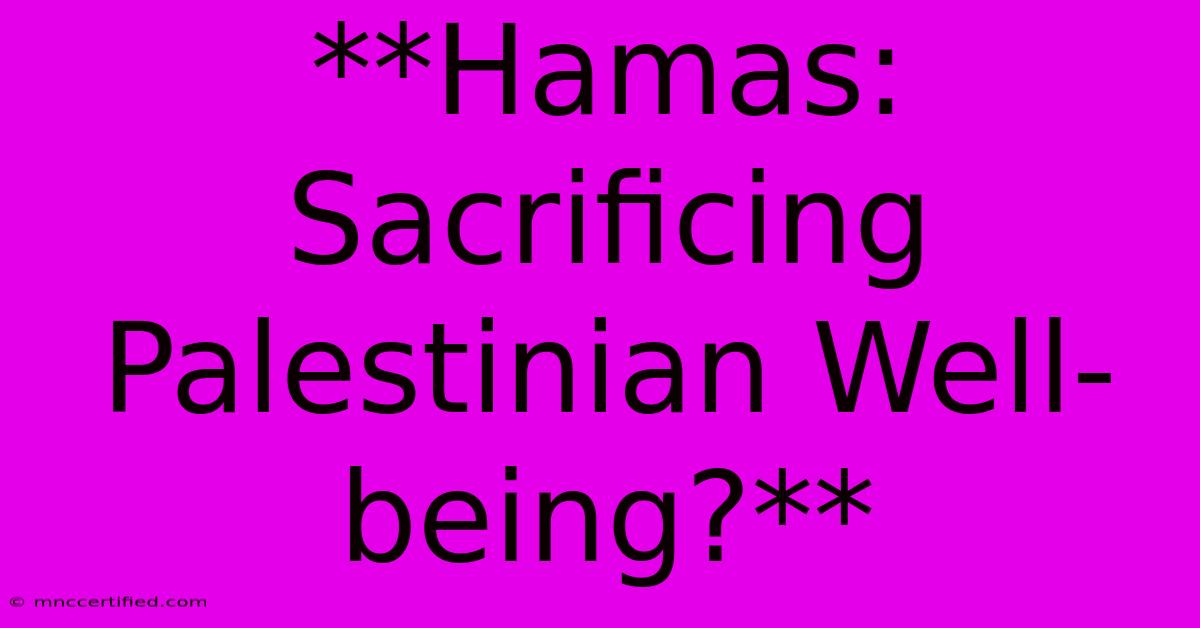**Hamas: Sacrificing Palestinian Well-being?**

Table of Contents
Hamas: Sacrificing Palestinian Well-being?
The ongoing conflict between Israel and Palestine has seen a resurgence in violence, with Hamas, the ruling party in Gaza, playing a central role. While Hamas claims to be fighting for Palestinian liberation, its actions have increasingly come under scrutiny, raising the question: Is Hamas sacrificing the well-being of the Palestinian people in pursuit of its political goals?
This article delves into the complex and sensitive issue, exploring the potential costs and consequences of Hamas's actions on the Palestinian population.
Hamas's Approach: Fighting for Liberation or Power?
Hamas, a militant Islamist group, has been in control of Gaza since 2007. It has a history of launching rockets and engaging in armed conflict with Israel, claiming it's a necessary defense against Israeli occupation and oppression. However, critics argue that Hamas uses violence as a tool to maintain its own power and control over the Palestinian population.
Hamas's actions have resulted in:
- Increased suffering: The ongoing conflict has led to immense destruction, loss of life, and displacement for Palestinians in Gaza. The Israeli blockade and repeated military operations have severely limited the availability of essential resources like food, medicine, and electricity.
- Economic stagnation: The conflict has crippled Gaza's economy, hindering economic development and employment opportunities. This has pushed many Palestinians into poverty and despair.
- Political isolation: Hamas's hardline policies and rejection of peaceful negotiations have alienated potential international allies and support. This has further hampered the pursuit of a lasting peace solution.
- Internal repression: Hamas has been accused of suppressing dissent and restricting freedom of speech within Gaza, creating a climate of fear and censorship.
The Costs of Conflict: A Human Toll
The human cost of the conflict is undeniable. Palestinians in Gaza suffer from severe humanitarian crises:
- Health crisis: Limited access to healthcare and medical supplies has resulted in widespread illness and death.
- Education crisis: Schools and universities are often closed due to conflict or lack of resources, affecting the education of future generations.
- Psychological trauma: The constant threat of violence and the loss of loved ones have left a deep psychological scar on the Palestinian population.
These challenges have significantly impacted the well-being and future prospects of Palestinians in Gaza.
Alternatives to Violence: Seeking a Path to Peace
While Hamas advocates for armed resistance, alternative paths to achieving Palestinian freedom and self-determination exist.
- Peaceful negotiations: Diplomatic efforts, based on mutual understanding and compromise, could lead to a lasting peace solution.
- Economic development: Investing in infrastructure, education, and economic opportunities can improve the lives of Palestinians and create a brighter future.
- International support: Seeking international cooperation and aid can help alleviate the humanitarian crisis and promote stability in the region.
The Importance of Open Dialogue
It is crucial to engage in open and honest discussions about the complex realities of the Palestinian-Israeli conflict. This includes:
- Addressing the root causes: Addressing issues such as Israeli settlements, Palestinian refugee rights, and the need for a two-state solution.
- Promoting a culture of peace: Encouraging dialogue, understanding, and empathy between Israelis and Palestinians.
- Supporting Palestinian civil society: Empowering Palestinian organizations advocating for peace and human rights.
Ultimately, achieving a sustainable and just peace requires both Israeli and Palestinian leadership to prioritize the well-being and future of their people.
This means moving away from violence and embracing dialogue and diplomacy as the path forward. While the challenges are immense, it is crucial to remain hopeful that a peaceful solution can be achieved.

Thank you for visiting our website wich cover about **Hamas: Sacrificing Palestinian Well-being?**. We hope the information provided has been useful to you. Feel free to contact us if you have any questions or need further assistance. See you next time and dont miss to bookmark.
Featured Posts
-
Manchester City Sancho Palmer Out Again
Nov 08, 2024
-
M6 Reopened After Lorry Driver Dies
Nov 08, 2024
-
Starbucks Holiday Cups See The New Designs
Nov 08, 2024
-
Westbrook Addresses Thunder After First Defeat
Nov 08, 2024
-
Pentagon Responds To Nk Troops In Russia
Nov 08, 2024